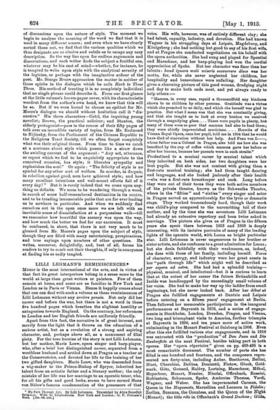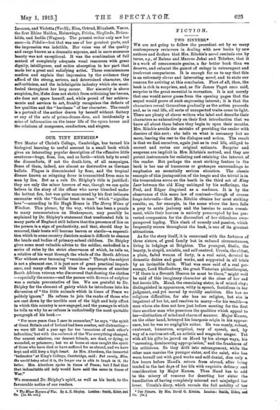LILLI LEHMANN'S REMINISCENCES.*
Music is the most international of the arts, and in virtue of that fact its great interpreters belong in a sense more to the world at large than great writers or painters. Few of them remain at home, and some are as familiar in New York and London as in Paris or Vienna. Hence it happily comes about that one can deal with such a volume as these reminiscences of Lilli Lehmann without any arriire penes. Not only did her career and before the war, but there is not a. word in these five hundred pages which breathes the slightest hostility or antagonism towards England. On the contrary, her references to London and her English friends are uniformly friendly.
Apart from this fact, the narrative is of great interest, not merely from the light that it throws on the education of a serious artist, but as a revelation of a strong and aspiring character, and, perhaps above all, as a monument of filial piety. For the true heroine of the story is not Lilli Lehmann, but her mother, Marie Loew, opera singer and harp-player, who, after a brief but distinguished career, separated from a worthless husband and settled down at Prague as a teacher at the Conservatoire, and devoted her life to the training of her two gifted daughters. Marie Loew, who was descended from a wig-maker to the Prince-Bishop of Speyer, inherited her talent from an artistic father and a literary mother; the only mistake of her life was her marriage to an operatic tenor, who, for all his gifts and good looks, seems to have earned Hans von Billow's famous condemnation of the possessors of that • Mu Pelt Through Life. By Lint Lehmann. Translated by Alice Benedict Bollsmou. With 50 Illuatrakon& Wow York and London: G. P. Putnam's se.. Else ea. seta voice. His wife, however, was of entirely different clay; she had talent, capacity, industry, and devotion. She had known Wagner in his struggling days at Leipsio, Magdeburg, and Konigsberg ; she had nothing but good to say of his first wife, and at Prague she conducted negotiations on his behalf with the opera authorities. Sbe had sung and played for Spontini and Marechner, and her harp-playing had won the cordial appreciation of Spohr. But her character was finer than her talents: hand ignore mall miseris sueeurrere disco was her motto, for, while she never neglected her children, her hospitality and benevolence were unfailing. Her daughter gives a charming picture of this good woman, drudging night and day to make both ends meet, and yet always ready to help others :— "Mamma, in every case, repaid a thousandfold any kindness shown to us children by other persona. Gratitude was a virtue which she preached to no daily, and which she herself was glad to practise. But what I mean was that she was constantly giving, and that she taught us to look at every bonbon we received through a magnifying glass.... There were pupils in plenty, but many of them were so poor that mamma had also to feed them; they were chiefly impoverished musicians. . . . Horwitz of the Vienna Royal Opera, once her pupil, told me in 1904 that he would have died of starvation without her help. And Frau von L—, whose father was a Colonel in Prague, also told me how she was benefited by the cup of coffee which mamma gave her before or after her lessons, because her parents wore in such straits." Predestined to a musical career by musical talent which they inherited on both sides, her two daughters were her best pupils. But she was not content with giving them a first-rate musical training ; she had them taught dancing and languages, and she looked jealously after their health —she was a first-rate housekeeper and cook. Long before they were out of their teens they were both active members of the private theatre, known as the Schwestka Theatre, where in the " fifties " and " sixties " every singer and actor in Prague served an apprenticeship for the lyrio or dramatio stage. They worked tremendously hard, though their work was child's-play compared to the unremitting toil of their mother, and by the time she was seventeen Lilli Lehmann had already an extensive repertory and been twice asked in marriage. The picture she gives us of Prague in the fifteen years she spent there between 1853 and 1868 is deeply interesting, with its incisive portraits of many of the leading lights of the operatic world, with Lucca as bright particular star. Lilli Lehmann is never ungenerous to her brother or sister artists, and she confesses to a great admiration for Lucca; but she deals faithfully with their weaknesses, as, indeed, she does with those of her family, including herself. Force of character, energy, and industry were her great assets in her "path through life" which might well be described as per aspera ad advs. She had had a splendid training— physical, musical, and intellectual—but it is curious to learn that at the outset of her career the future Briinnhilde and Isolde was handicapped by the exceedingly small volume of her voice. She had to make her way up the ladder from small beginnings, but she never looked back. After her data at Prague she fulfilled engagements at Dantzio and Leipeio before entering on a fifteen years' engagement at Berlin. Then followed her memorable participation in the inaugural performances at Bayreuth in 1876, and a series of engage. meats in Stockholm, London, Dresden, Prague, and Vienna, two long and triumphant visits to America, further triumphs at Bayreuth in 1896, and ten years more of active work, culminating in the Mozart Festival at Salzburg in 1906. Even after this she fulfilled various star engagements, and in 1910 was entrusted with the "production" of Don Juan and Die Zauberfigge at the next Festival, besides taking part in both operas. Her "opera repertoire" given on pp. 489-495 is a moat remarkable document. The number of parts she has filled is one hundred and fourteen, and the composers repre- sented are forty-nine, including Anber, Beethoven, Bellini, Bizet, Cherubini, Delibes, Donizetti, Flotow, Gluck, Gold- mark, Gotz, Gounod, Hairy, Lortzing, Marschner, Maul, Meyerbeer, Mozart, Hessler, Hicolai, Offenbach, Rossini, Rubinstein, Schumann, Spohr, Ambroise Thomas, Verdi, Wagner, and Weber. She has impersonated Carmen. the Queen in the Huguenots, Marzellina and Leonora in Fiddle; Zerlina, Susanna., the Countess, and the Queen of the Night (Mozart); the title rifle in Offenbach's Grand Duchess ; Gild., Leonora, and 1Tioletta (Verdi); Elsa, Ortrud, Elizabeth, Venus, the first Rhine Maiden, Helmwiege, Fricke, Sieglinde, Brims- hilde, and IaoLie (Wagner). The present writer only saw her once--in Fidelio—but that was one of her greatest parts, and the impression was indelible. Her voice was of the quality and range known as a dramatic soprano, and in mere aensuone beauty was not exceptional. It was the combination of full sontsol of completely adequate vocal resources with great dignity, intelligence, and entire absorption in her part that made her a great and satisfying artist. These reminiscences confirm and explain that impression by the evidence they afford of the strong, serious, and determined character, the self-criticism, and the indefatigable industry which she mani- fested throughout her long career. Her sincerity is above suspicion, for, if she does not shrink from criticising her heroes, she does not spare herself, and, while proud of her achieve- ments and services to art, frankly recognizes the defects of her qualities and the " hardness " of her character. The result is a portrait of the author drawn by herself without flattery or any of the arts of prima-donna-dom, and incidentally a mine of information on the inner life of the opera house and the relations of composers, conductors, and singers.



































 Previous page
Previous page